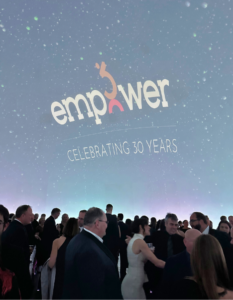NEW MEMBER SPOTLIGHT
Meet Germaine Perez, Director of Finance at PSM Partners
Welcome to EFBC! It’s great to meet you. Can you tell us a bit about your role at PSM Partners and what led you there?
I’ve been at PSM for seven years. Before that, I got my degree in accounting and worked in AR/AP roles, then joined a consulting firm owned by WPP, working in media finance. One day I got a LinkedIn message from Dan Picaro at PSM. I came in for a casual interview and was employee #30—the first woman in the company.
Wow, that must’ve been intimidating.
Very. It was all men at the time, but they welcomed me. I was hired as a controller, but there was no accounting team—just me. I had to build everything from scratch: invoicing, payroll, HR—even though I had no background in HR.
That’s a lot to take on
It was. The first few months were rough, but I stuck with it. I created all the processes, task lists, how-to guides. Seven years later, we’re still using them. My title evolved from Controller to Director of Finance. I now have a team: a senior accountant, an accounting clerk, and some shared HR support.
When I started we were 30 people—now we’re over 110. I’ve always advocated for more female presence, so I built a mostly female team. We now have more women across departments, including marketing and HR. It’s been really fulfilling.
You’ve clearly made a big impact.
Thank you. I brought a lot of structure from my public company background—everything gets documented and saved. Our CPA from Cray Kaiser even complimented how clean the books are. That’s something I’m really proud of.
What led you to EFBC?
Mike from PSM encouraged me to join to invest in myself. I’d been wanting continuing education—especially with how fast tech and finance are evolving. I’ve attended EFBC roundtables before, but never a Forum. After my test Forum, I really liked it—it was welcoming and the discussions felt relevant to
Welcome to EFBC, Germaine!
EFBC President’s Message: Leading Through Transition
Dear EFBC Members,
For this month’s letter, I’ve been thinking a lot about Transition, the role it play in our businesses and our lives.
We’ve had our final official EFBC board meeting for this fiscal year, and will be meeting next month to transition and onboard our next leadership team. Whether it’s handing off a leadership role, bringing in a new team member, or even preparing the next generation to lead, transition is always happening. And while we often treat it like a moment in time, the truth is: good transitions are a process.
They take preparation, communication, and, perhaps most importantly, humility. That includes the willingness to let go – of control, of routines, and sometimes even of the sense that everything needs to be done our way. Letting go isn’t easy, especially when we care deeply. But it’s often the most generous, most effective and most forward-looking thing we can do.
The same idea applies in our companies. The best transitions happen when we plan and invest early – building people up, creating clarity, and trusting others to carry things forward. That kind of preparation helps things run smoothly, but more importantly it creates room for growth.
So this month, I’d invite you to reflect on the transitions ahead in your own world. Are you setting them up with intention? Are you preparing others—not just with information, but with encouragement? And are you making space for new ideas to emerge by letting go where needed?
Transitions are never perfect. But when done well, they can unlock the next chapter of growth for both an organization and the individuals within it.
Thanks for reading,
![]()
Darrin Shillair – EFBC President 2024-2025
ODEA Audio Whitepaper: How We’re AI Enabling ODEA’s Operations
This week’s whitepaper comes from our strategic partners at ODEA.
In this audio whitepaper, the ODEA team shares how they’re integrating AI tools into their day-to-day operations—saving time, improving workflows, and working smarter across the board.
AI Tools for Small Businesses: Streamline and Compete
Small businesses often operate with lean teams where employees wear multiple hats. Unlike large corporations with specialized departments for marketing, finance, customer service, and operations, small business owners and their teams must juggle various responsibilities to keep things running smoothly. But managing everything manually can quickly lead to burnout and inefficiency.
This is where AI tools for small businesses can make a significant impact. Artificial intelligence is no longer a luxury reserved for big companies—it’s an accessible and cost-effective solution that allows small businesses to streamline operations, improve productivity, and compete more effectively.
How AI Supports Small Business Owners
Large companies have the capacity to hire employees for every different function, however, that is simply not possible for many small to medium size businesses. AI-powered tools can take on tasks ranging from customer support to marketing automation, allowing business owners to focus on growth and compete with the big guys. Here are some key areas where AI tools can help:
1. Marketing and Content Creation
AI can assist with content creation, social media posts and management, and email marketing, reducing the time needed to develop and execute campaigns. Tools like ChatGPT, Jasper Copy.ai
can generate blog posts, product descriptions, and engaging social media captions in seconds. Meanwhile, AI-driven platforms such as Canva’s Magic Write can help design marketing materials quickly and efficiently.
2. Financial Management
Small business owners often struggle with bookkeeping and financial management. AI-driven accounting tools like QuickBooks, Xero, and Wave have ai powered features that can help automate expense tracking, invoicing, and financial forecasting, saving business owners valuable time while ensuring accuracy.
3. Sales and Lead Generation
AI-powered CRM (Customer Relationship Management) tools like HubSpot, Pipedrive, and Salesforce AI can help small businesses track customer interactions, automate follow-ups, and personalize outreach efforts to boost sales without requiring a large sales team.
4. Operations and Productivity
Managing projects, scheduling meetings, and organizing workflows can be overwhelming. AI-enhanced tools like Trello, Notion AI, and Asana help streamline operations by automating task management and optimizing team collaboration, making day-to-day operations more efficient.
ODEA’s Perspective on AI for Small Businesses
Patty Rioux, of ODEA, recently shared insights on the Mind Your Own Marketing Business podcast about the rapid impact of AI on marketing and business operations.
She recalled the early days of conceptualizing TRYBL, ODEA’s sister company, and her initial uncertainty about investing in AI or the potential of an AI-driven knowledge-based business. To bring the vision to life, her team experimented by generating rough logo concepts for the hypothetical company using ChatGPT. That’s when Patty had her “Oh shit” moment—AI was more important than ever, and there was no escaping it. With that realization, TRYBL was born, focusing on helping small and medium-sized businesses leverage AI from an operational standpoint to remain competitive with larger enterprises.
She emphasized that AI has the potential to transform small and medium-sized businesses by enhancing operational efficiency. Unlike large corporations with Chief AI Officers, small businesses need to leverage AI strategically to remain competitive.
At ODEA, they integrate AI into their operations with tools like GPT for brand guides and Proposal Guru for AI-generated proposals, using AI to streamline workflows while continuously learning. Rioux also notes that AI is evolving rapidly, and no one is truly an expert—constant adaptation is key.
Listen to the full podcast episode here.
The Competitive Advantage of AI
By integrating AI tools, small businesses can level the playing field, increasing efficiency without expanding their workforce. This allows teams to focus on strategic growth instead of getting bogged down in repetitive tasks.
NEW MEMBER SPOTLIGHT
Meet Mark Falotico, Account Relationship Manager at Haskris
Welcome to EFBC! It’s great to meet you. Can you tell us a bit about your role and what Haskris does?
Thanks! It’s great to be here. Haskris is a third-generation family business—my dad and sister are both EFBC members and my dad’s actually been in EFBC for 30 years now. We design and manufacture custom process water chillers, primarily for high-tech applications. MRIs are our biggest market, but we also serve industries that use electron microscopes, semiconductor tools, and other advanced technologies. A lot of what we do involves tight temperature control—some machines cost over $10 million and need extreme precision.
That’s a lot more advanced than what people probably expect when they hear “water chillers.” Have you worked on anything unexpected?
Yeah, one of the more interesting shifts came about three years ago when the cannabis industry started reaching out to us. They needed chillers that could handle extreme temperature ranges—up to 300°F and down to -80°C—and there just wasn’t anyone else in North America making them at the size or quality they needed. That opened the door to working with distillation companies too, for things like incense and food extracts. It’s a pretty niche but fast-growing area.
Have you always been involved in the family business, or did you take a different path before joining?
I always had a feeling I’d end up at Haskris, but I wanted to explore other opportunities first. I went to Illinois Wesleyan University, studied economics, and minored in entrepreneurship. After graduating in 2019, I joined BMO Harris. I ended up on the asset-based lending team, which gave me great experience and exposure to different businesses. But when Haskris was expanding, the timing felt right to come back. I joined about four years ago and started in our customer relations team, learning the technical side, quoting systems, and supporting OEM accounts. Now I lead that team and manage relationships with our OEMs.
Did growing up in the business shape how you saw your career?
For sure. I grew up around the business—literally. After church on Sundays, we’d stop by the office to get the test units running for Monday. I’d run around the shop and hear business conversations at the dinner table. It was a full immersion. But I still went into college and banking with an open mind. If I’d found something I loved, I might have stayed on that path. Coming back to Haskris gave me a new appreciation for what we’ve built. I love working with my family, and we’ve built a great culture here. It’s competitive in the best way and really collaborative.
As a new EFBC member, what are you hoping to get out of the experience?
I’m excited to learn from shared experiences of EFBC members. There are unique challenges that come with being in a smaller family business and hearing how others have navigated those situations is incredibly valuable. I also want to give back. EFBC has done so much for our family over the years, helping shape our policies and structure, especially in the earlier generations. I’d like to share what I’ve learned too—because a lot of that learning comes from the hard stuff, the mistakes and missteps. If I can help someone avoid a few of those, that’s a win.
That’s amazing. I didn’t realize your family’s connection to EFBC went back that far!
For me, EFBC is my version of getting a business degree.
I was a nurse—I didn’t go to school for business. But here, I have access to people who are experts in different areas.
Also, I finally have a real sounding board beyond just Mike. I can ask questions, learn from other people’s experiences, and be part of a community of business owners who “get it.”
Ultimately, I want to learn how to grow my team in a smart, strategic way. The goal is to scale the business so I can focus on big-picture growth while my team handles the day-to-day.
Welcome to EFBC, Mark!
EFBC President’s Message: Gratitude
Dear EFBC Members,
I have a short letter for this month – speaking briefly to Gratitude.
As we celebrated our 30th anniversary gala last Friday, I feel personal gratitude for getting to see many of our members and celebrate with you all.
I feel a great gratitude to the EFBC organization, it’s history, and the great value that it has provided not just to me, but to multiple generations of business leaders over the past 3 decades.
And last, but certainly not least, I feel a great gratitude and appreciation for our amazing staff, who pulled off an impressive and seamless event for us all to gather.
On a lighter note, I feel gratitude that the sun is shining today and it feels like spring is finally here.
Warm regards,
![]()
Darrin Shillair – EFBC President 2024-2025
30th Anniversary Gala: A Night to Remember
 On Friday, April 25, the Entrepreneur and Family Business Council community came together for an unforgettable evening at the Adler Planetarium to celebrate 30 years of connection, growth, and resilience.
On Friday, April 25, the Entrepreneur and Family Business Council community came together for an unforgettable evening at the Adler Planetarium to celebrate 30 years of connection, growth, and resilience.
Throughout the night, faces old and new filled the room, sharing stories, laughter, and plenty of dancing. We were honored to hear from BJ Slater, who delivered a moving speech about the profound impact EFBC has had on his life. His words were a powerful reminder of why EFBC exists: to support each other through the highs and lows of business and life.
Our faithful Director, Liz Fidanovski, also took the stage with a heartfelt message of gratitude to the EFBC community. But truly, this community would not be possible without Liz’s vision, leadership, and unwavering dedication. She has been the driving force behind EFBC and the visionary who made this celebration—and so much more—possible.
We took time to recognize our longtime members, some of whom have been part of EFBC for over 25 years—a testament to the lasting relationships at the heart of our organization.
We also extend a special thank you to our eight Strategic Partners, who are essential to EFBC’s strength. As BJ noted, our partners offer members easy access to trusted experts across HR, finance, healthcare, manufacturing, and more, making EFBC a true resource as well as a community.
As we celebrated this milestone, we reflected on the dream that started it all. Our founder, Jim Liautaud, once captured the spirit of EFBC in a poem that continues to inspire us today:
There are times in our lives
we create a dream,
serving something grander than ourselves.
And the more unusual,
and against most odds,
We become challenged by many
and attacked by some.
I’ve come to believe
it’s nature’s way of challenging change—
testing the core of our belief,
testing our resolve,
where only time and proof
will evidence its merits.
Those that never waver
create a better dream—
one that more embraces
their best believers,
to make a better team.
The only time we stand to lose
is if, so weakened,
we abandon our believers
to attack our attackers,
And lose the good inside of us.
We forget—
it’s only nature’s way
of testing our resolve.
– Jim Liautaud, EFBC Founder
Thank you to everyone who has helped build EFBC’s legacy. Here’s to the next 30 years and beyond.

30 Years of EFBC: From a Bold Idea to a Thriving Community

This month, we’re celebrating a milestone that’s three decades in the making. What began as a simple idea—supporting the unique needs of family and entrepreneurial businesses—has grown into a resilient, values-driven community of leaders, learners, and legacy builders.
In 1993, entrepreneur James P. Liautaud approached the University of Illinois at Chicago with a vision: to create a council where family businesses could access resources, education, and—most importantly—each other.
The first members joined in 1994, and the Family Business Council was born.
For years, we operated as a nonprofit fund within UIC’s College of Business Administration. But as membership grew and regulations tightened, a turning point came. In 2011, with the support of 135 members and our Board of Directors, we became an independent nonprofit: the Chicago Family Business Council.
Then in 2012, we found a new home at DePaul University’s Driehaus College of Business, and the next chapter began.
In 2019, we reintroduced ourselves to the world with a new name—the Entrepreneur and Family Business Council (EFBC)—along with a refreshed brand, a new logo, and an expanded mission. We weren’t just focused on family businesses anymore. We recognized that entrepreneurial leaders across industries shared common challenges, and that our model of peer connection and shared experience could serve them too.

Through all the changes, EFBC’s core values—trust, confidentiality, openness, and growth—have never wavered. Neither has our belief in the power of community.
From just a handful of Forums, we’ve grown to 13 active Forum groups meeting throughout Chicagoland. Our events calendar has grown too, offering more and more educational programs each year, along with workshops, roundtables, and student engagement. Our Strategic Partners continue to provide invaluable expertise, and our members give back through committee service, mentoring, and shared experiences.
This month’s 30th Anniversary Gala at the Adler Planetarium is not just a celebration of our past—it’s a recognition of all the people who shaped this journey: our founders, our university partners, our volunteer leaders, and every member who has shown up to a Forum, shared a challenge, and supported someone else through theirs.
We’ve come a long way since 1994. And as we reflect on the last 30 years, we do so with gratitude—and excitement—for what’s still ahead.
Happy Anniversary, EFBC. Here’s to the legacy we’ve built together.


NEW MEMBER SPOTLIGHT
Meet Jessica Licari, Founder of Fork It Foods
At EFBC, we are always excited to welcome new members who bring unique experiences, perspectives, and entrepreneurial journeys. One of our newest members, Jessica, founder of Fork It Foods, has an inspiring story that took her from 14 years as a nurse in Loyola’s burn unit to launching and growing a thriving catering and events business.

We sat down with Jessica to hear about her transition from healthcare to entrepreneurship, the challenges she faced along the way, and what led her to join EFBC.
Can you give us a basic overview of your background and career thus far? What led you to start Fork It Foods?
Yeah! I actually started my career in healthcare—I was a nurse for 14 years at Loyola in the burn unit. It was a really tight-knit group, and I loved medicine, but I also had a huge passion for cooking.
I would always make food for my coworkers, and they really enjoyed it. Eventually, people started asking, “Can we pay you for this?” So I thought, maybe this could actually be a business.
At first, I just created a small menu and took weekly orders. I kept refining the process, and after about a year, I realized, this could be something real.
In September 2018—just 10 days before my 40th birthday—I officially left my nursing career and went full-time with Fork It Foods.
That’s a huge career transition! What was your original business model, and how has Fork It Foods evolved since then?
We started as a meal prep company—think Blue Apron, but fully cooked and ready to eat. Customers would place orders, we’d cook everything fresh, and deliver meals for the week.
At the same time, I was building relationships with farmers and vendors at local markets. Some of our customers wanted everything to be farm-to-table, so I started sourcing fresh cheeses, meats, and produce.

@forkitgrazing
That’s when I noticed something interesting—grazing tables were becoming popular in Australia, but not many people were doing them here. We decided to test it out.
Our first grazing table event was in June 2018, even before I officially left nursing. It took off, and that side of the business really started growing. Eventually, catering and events completely overtook the meal prep side, and we had to pivot.
How did COVID-19 impact your business?
Oh, it was a rollercoaster. We had just moved into our own commercial kitchen space in December 2019, and three months later, the world shut down.
At first, we didn’t know what would happen. We had to cancel our grand opening. My business partner at the time wasn’t comfortable coming back to work, so I bought her out.

@forkitgrazing
But then something unexpected happened—meal prep picked back up.
During COVID, grocery stores were empty, and people didn’t know where to get food. Since we were already set up for meal prep and delivery, we filled a huge gap. Most restaurants weren’t ready to pivot to takeout, but we had the packaging, the logistics, and the systems in place.
We stayed afloat and even grew during 2020, which was incredible. But once things opened back up, I had to make a tough decision—keep the meal prep or go all-in on events and catering.
It became clear that catering was the future of the business, so in 2022, we fully transitioned to event catering, grazing tables, and corporate experiences.
What does Fork It Foods look like today?
So now, it’s a lot. We still do grazing tables—that’s really the heart of it—but it’s grown way beyond that. We’ve got our own private event space now, which has been great. We host everything there—corporate stuff during the week, cocktail parties, even community events.
We also have a tap trailer, which is this super cute little teardrop trailer we converted. It has taps on the side for beer, wine, cocktails—it’s perfect for off-site events.

@forkitgrazing
And then we do nationwide shipping for our grazing boxes, which people love for corporate gifts or remote events.
How did you first hear about EFBC, and what made you decide to join?
I first heard about EFBC in 2018 through Mike Mete, of PSM Partners. He actually brought me to an event back then and told me, you HAVE to join.
At the time, I couldn’t afford it—I was still in the early stages of the business. But EFBC stuck in the back of my mind.
Mike has always been my go-to person for business advice. He was like my personal EFBC of one—the only person I could bounce ideas off of.
Last year, he invited me to another EFBC event, and this time, it just made sense. I talked with Liz, and after hearing more about the community, I knew I was ready to join.
What are you hoping to get out of EFBC?
For me, EFBC is my version of getting a business degree.
I was a nurse—I didn’t go to school for business. But here, I have access to people who are experts in different areas.
Also, I finally have a real sounding board beyond just Mike. I can ask questions, learn from other people’s experiences, and be part of a community of business owners who “get it.”
Ultimately, I want to learn how to grow my team in a smart, strategic way. The goal is to scale the business so I can focus on big-picture growth while my team handles the day-to-day.
Welcome to EFBC, Jessica!
Jessica’s story is a great example of how passion, resilience, and adaptability can lead to entrepreneurial success. We are thrilled to have her as part of the EFBC community and can’t wait to see how Fork It Foods continues to grow! Connect with Jessica in the EFBC Member Hub!






